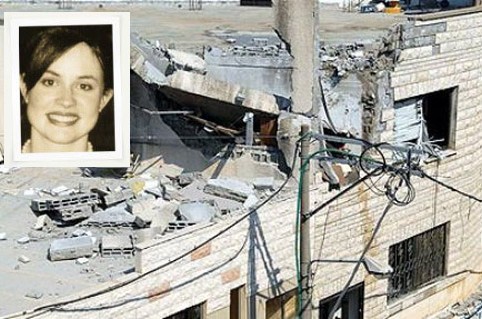'אסק מוזס': מאמר מומלץ באנגלית על המצב בישראל

In my first three decades, I never heard a real explosion up close...or lived in a war zone. That was until last Thursday, July 13, 2006.
Bombing was faint as I made my way to work after running errands. The Hezbollah was busy – again – attacking northern border towns. It was “old news” and sadly did little to faze most. Surprisingly, smoke from missile fire rising off nearby Mt. Meron raised little alarm.
Around 2 p.m., my co-Tzfatians and I were shocked to discover that our small town of 20,000 was next on the terrorist target list. Two distinct booms were followed by an even louder whoosh and explosion from extremely close proximity. Shaking in fear, I tried to find my bearings, unsure what to do next.
My employer got a call that a rocket landed adjacent to his house and the area was up in flames. He dashed out in a panic to go save his family (they are all safe and well, thank G-d).
Pandemonium followed as people tried to call their families, find out where the bombs struck, and make their anxious way home. Within moments the offices cleared out, everyone in a frightened daze.
! I do not own a car, and all bus and taxi services had frozen in the ensuing mayhem, but I had to get home. I began walking and saw windows shattered from the blast, and pieces of asphalt strewn around, having flown tens of feet from the blast’s impact. Cops (and the omni-present media) were everywhere. Thanks to the kindness of two strangers, I hitched my way to find my husband and children and a few dozen neighbors huddled in the bomb shelter in the basement of my apartment building.
This was but the dramatic beginning of several days of bombing—which has still yet to end. I have not kept count of all the bombs I have heard fall. It’s in the several hundreds. Though most are distant, three exploded within a two minute walk from my house.
They shook my home, rattled the windows, and sent my family frantically running time and again to the “safe room” we set up in a kids’ bedroom. We all sleep wall-to-wall in that same room since the war’s start, so the children won’t be afraid, and so we will be together “just in case.”
So my innocence of explosion-less three decades has been lost to my children, the oldest of whom is still only six and a half. The slightest “bump” makes them jump in fear thinking it’s another “boom”; and my not-yet-three year old made up a “happy” tune called, “We don't have a bomb…”.
A block away from my home, my day-care babysitter’s apartment complex was bombed and caught fire. She spent her day in my house while the fire was extinguished and the bomb was defused. It took hours since the missile was composed of fifty mini-bombs each meant to maximize the destruction (and they miraculously did not go off!). My sitter distracted herself from the trauma by playing with my bored children who have cabin fever after days of being cooped up at home.
My upstairs neighbor was hit with shrapnel from the first Tzfat bombing and was hospitalized. Apparently, she will be living with some pieces of glass and metal in her side for many years to come. Fortunately, she was discharged the day before the hospital itself was nearly hit by a missile that landed within feet of the facility, causing significant structural damage but claiming no casualties.
So why am I still in Tzfat?
There are no banks, postal services, or businesses, almost no medical clinics and only a handful of grocery stores still open. At least they are still collecting garbage… Many of my friends, relatives and neighbors have left, and I understand why. The fear can be debilitating.
But in leaving Tzfat, only the fear, not the danger, is left behind. Cities further south have been hit, and Hezbollah claims to have even farther reaching rockets, so where would we go? Leave Israel? I firmly believe in what the Lubavitcher Rebbe reiterated (war) time and again—“Israel is the safest place in the world. ‘The L-rd our G-d’s eyes are constantly upon Her from the beginning of the year until the end of the year.’”1 It is a challenge to trust that G-d is protecting us, but it is a fact. With every missile comes another miracle story.
No words can make up for the lives lost or hurt in this war (may there be no more!), but the miracles far outweigh the tragedies. To give just one example: According to the bomb squad, on Shabbat afternoon alone, 35 missiles landed in Tzfat, twelve of them in people’s homes—and no one was even scratched!
And out of the smoldering rubble and hovering sense of trepidation, come inspiration and meaning:
Hearing a war outside your front door, can’t help but make you start to do some introspection. We cannot answer the “why” for what G-d is doing, but we definitely feel Him here with us. People from across the religious spectrum are searching for ways to be more spiritually involved.
Those who have not prayed in years, have re-opened their hearts and mouths to G-d; and for those who do pray daily, prayer has been refreshed bringing new meaning to ancient words, along with some personal prayers added to the liturgy. It’s a spiritual wake-up call, and we are listening loud and clear. Whether it be through lighting a Shabbat candle, lending a helping hand to someone in need, or putting on tefillin, each person is finding his or her way to sanctify the situation—to connect to G-d especially now.
We’ve pressed the “reset” button of our priorities. A shattered dish, spilled juice, and bedtime at 8 p.m. sharp are now insignificant. Petty quarrels between neighbors and family feuds take a back seat to harmony and love. Thoughtless remarks are quickly forgiven, and it’s easier to see the sunny side of even the most difficult people. Appreciating family at every moment is paramount. All time is quality time, and we take comfort in being here—together.
The war began on the fast of the 17th of Tamuz. This date begins the Three Week mourning period for many tragedies which befell the Jewish nation, the greatest of which was the destruction of both Temples on the 9th of Av. The primary cause for second Temple’s destruction and current exile was the senseless hate felt among fellow Jews. The remedy for that hate is to have unconditional love for our fellows.
I am witness to a boundless rise in unconditional love. People of all ages, backgrounds, and observance levels are now bomb shelter roommates sharing food, jokes, chess sets, blankets, and words of encouragement. Today, volunteers surprised us with hot kosher food portions, bread and fruit, besides smiles and good wishes.
Community members are pulling together to offer what services they can (babysitting, shopping, free food) to the ease the strain. People I have not heard from in years are calling from the US to ask about our well-being. We received warm invitations from close friends and distant acquaintances to come stay in their houses till the war ends.
My husband and I, and even our children, are also trying to offer what support we can, be it through story hour for kids, or a neighborhood gathering in the bomb shelter replete with refreshments, l’chaim, and words of Torah. Everyone is giving and wholeheartedly. I am sure G-d sees all these acts of kindness, and He is proud. May the merit of these mitzvahs bring the end of the exile and cause the rebuilding of the third and everlasting Holy Temple in Jerusalem, our eternal capital.
As I write these lines and hear the distant explosions, I pray for the end of the war, and the era when “swords will be turned into plowshares”2 and true and eternal peace will reign. May it be now.
*****
Dear Reader,
I write to you from the sounds of sirens, in the hope that many like you will read my article. Why? Because I believe that you not only care and want to be informed, but also that you want to help. So what can you do to make peace happen?
• Pray.
• Give what you can to charity.
• Add another mitzvah or Torah learning to your day.
• Write letters to politicians and raise public awareness in support of the Holy Land.
• Influence other people to do all the above.
May you be rewarded abundantly for all your good efforts.
Shalom,
Nechama D. Kumer
The Holy City Tzfat, Israel

אם מישהו יתרגם זה יהיה מצוין
בבקשה תתגרמו את המאמר.
ישר כוח מראש.

















 מאפשרים לכם לקבל
מאפשרים לכם לקבל
